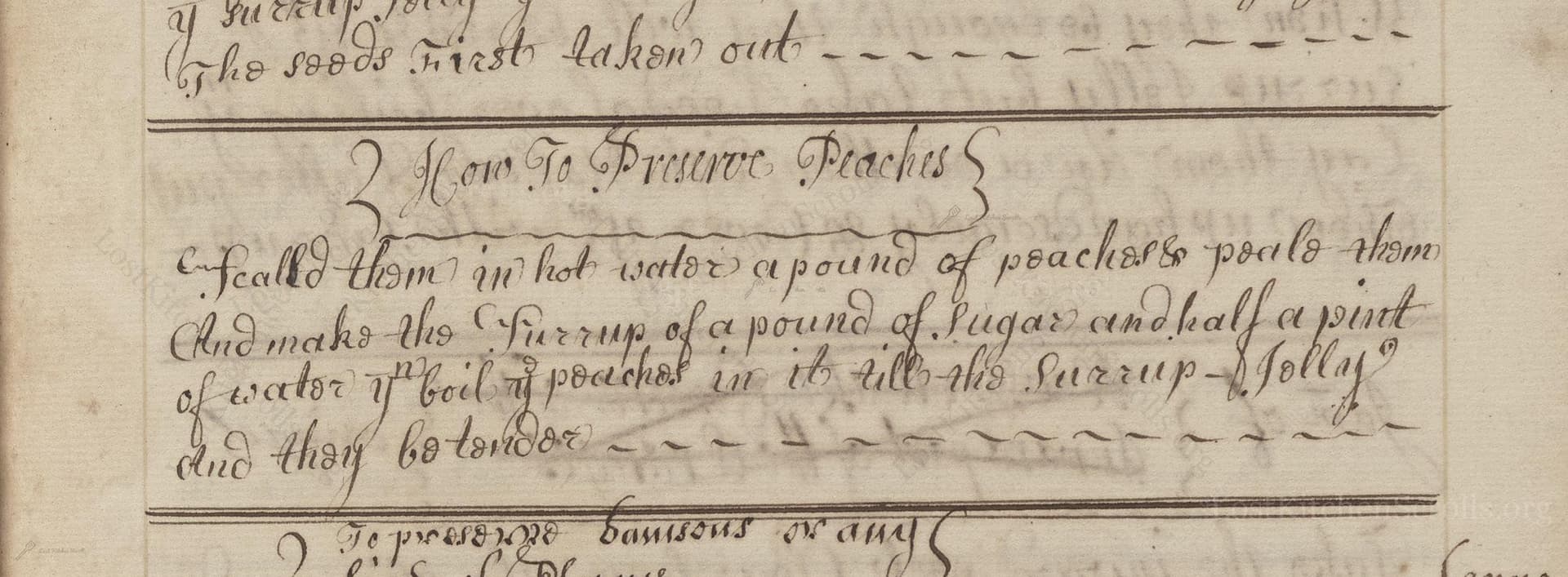
How To Preserve Peaches
"Scall'd them in hot water a pound of peachs peale them And make the surrup of a pound of Sugar and half a pint of water yn boil ye peaches in it till the surrup Jolly and they be tender ---"
Note on the Original Text
The recipe is written in a straightforward, almost telegraphic style, common for the era. Quantities are given relative to the weight of peaches—'a pound of peachs'—and the mixture is cooked until 'tender' and the syrup is 'jolly,' meaning thick and glossy. Spelling is charmingly variable ('Scall'd' for 'scalded,' 'surrup' for 'syrup,' 'yn' for 'then') and abbreviations ('ye' for 'the') abound. The brevity of instructions assumes familiarity with fundamental kitchen skills, typical of manuscripts designed for experienced domestic cooks.

Title
English cookery and medicine book, (1694)
You can also click the book image above to peruse the original tome
Writer
Unknown
Era
1694
Publisher
Unknown
Background
A delightful journey through late 17th to early 18th-century kitchens, this tome features recipes, culinary wisdom, and mouthwatering secrets from an era where feasts reigned supreme and the art of cooking was celebrated with flourish.
Kindly made available by
Folger Shakespeare Library
This recipe comes from a handwritten household manuscript dated approximately between 1677 and 1711. It reflects the burgeoning interest in sugar preservation methods that swept through English kitchens in the late 17th and early 18th centuries, a time when sugar was both a coveted luxury and a marker of status. Preserving fruits like peaches was not merely practical; it was also an opportunity for display, as these preserved delights graced the tables of those wealthy enough to afford them.

In the original method, a large copper or brass pot would likely have been used to heat water for scalding and simmering, with tongs or a slotted spoon for handling the hot fruit. A knife—probably simple and utilitarian—would peel the fruit; wooden spoons would stir the syrup. Jars or ceramic containers, sealed with parchment or wax, stored the finished preserves. These were all typically arranged over an open hearth, carefully tended by skilled hands.
Prep Time
10 mins
Cook Time
25 mins
Servings
4
We've done our best to adapt this historical recipe for modern kitchens, but some details may still need refinement. We warmly welcome feedback from fellow cooks and culinary historians — your insights support the entire community!
Ingredients
- 1 lb ripe peaches (or substitute nectarines if peaches unavailable)
- 1 lb granulated sugar (white, cane sugar recommended for clarity)
- 1 cup water
Instructions
- Begin by bringing a large pot of water to a rolling boil.
- Drop whole ripe peaches (about 1 lb per batch) into the hot water for about 30 seconds to 1 minute, just until skins loosen.
- Immediately remove and plunge into ice water.
- Peel the peaches carefully.
- Next, prepare a syrup by combining 1 lb granulated sugar with 1 cup water in a saucepan.
- Bring this to a gentle simmer, stirring until the sugar dissolves completely.
- Add the peeled peaches to the syrup and simmer gently until the peaches are tender yet holding their shape, and the syrup has thickened slightly to a glossy consistency—usually 20-30 minutes.
- Transfer peaches (with their syrup) to sterilized jars for storage, or allow to cool and serve as a compote.
Estimated Calories
160 per serving
Cooking Estimates
You will need about 10 minutes to peel the peaches and make the syrup. Cooking the peaches in the syrup takes around 25 minutes. This recipe makes about 4 servings, with each serving containing about 160 calories.
As noted above, we have made our best effort to translate and adapt this historical recipe for modern kitchens, taking into account ingredients nowadays, cooking techniques, measurements, and so on. However, historical recipes often contain assumptions that require interpretation.
We'd love for anyone to help improve these adaptations. Community contributions are highly welcome. If you have suggestions, corrections, or cooking tips based on your experience with this recipe, please share them below.
Join the Discussion
Rate This Recipe
Dietary Preference
Main Ingredients
Culinary Technique

Den Bockfisch In Einer Fleisch Suppen Zu Kochen
This recipe hails from a German manuscript cookbook compiled in 1696, a time whe...

Die Grieß Nudlen Zumachen
This recipe comes from a rather mysterious manuscript cookbook, penned anonymous...

Ein Boudain
This recipe comes from an anonymous German-language manuscript cookbook from 169...

Ein Gesaltzen Citroni
This recipe, dating from 1696, comes from an extensive anonymous German cookbook...
Browse our complete collection of time-honored recipes



